

Principal Investigator, University of Washington Applied Physics Laboratory
Wu-Jung Lee is a senior oceanographer at the Applied Physics Laboratory, University of Washington where she leads the Echospace group. She works at the intersection of physics, engineering, and biology, developing computational methodologies and interpretation frameworks to extract mid- to high-trophic level biological information from ocean acoustic data across multiple spatial and temporal scales. She also studies echolocating bats and toothed whales as biological models for adaptive ocean sensing. She is an active contributor to open-source scientific software (see echopype ) and an advocate for building a community centered around data science in oceanography (see OceanHackWeek ). Wu-Jung received her bachelor’s degree in electrical engineering and life science from National Taiwan University and her Ph.D. in oceanographic engineering from the Massachusetts/Woods Hole Oceanographic Institution Joint Program in Oceanography. She enjoys being in the mountains and drawing.
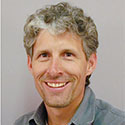
Principal Engineer, University of Washington Applied Physics Laboratory
Eric Boget specializes in the operation of research vessels. He is licensed by the U.S. Coast Guard as a vessel operator and engineer. He is also experienced in rigging and deploying oceanographic equipment and is certified by the University of Washington as a research diver. He is currently responsible for the operation and maintenance of the University of Washington Applied Physics Laboratory’s research vessels. Mr. Boget joined the laboratory in 1990.
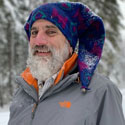
Captain, University of Washington Applied Physics Laboratory
Andy Ellers has served as master and mate around the world aboard a variety of vessels — from passenger vessels to sail-training ships and from consulting on movie-making to running yachts. However, over the past 15 years, his principal ongoing gig has been operating research vessels for the University of Washington’s Applied Physics Laboratory. Born and raised in Ohio, after college Andy began wandering and working in various interesting places and inadvertently stumbled into maritime work — which has resulted in a 35-year career (so far!). When not underway on a vessel, he spends time at his home in the woods just north of Seattle or running off to enjoy the nearby mountains.
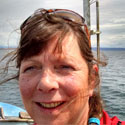
Marine Policy Advisor Quileute Tribe/Marine Biologist
Early in her career, Jennifer Hagen worked at sea aboard one of NOAA’s research vessels, participating in a variety of oceanographic research topics from Antarctica to the Arctic. Later, she again sailed aboard NOAA ships as part of a NOAA scientific team conducting fishery toxicology research such as damage assessment from the Exxon Valdez oil spill in Alaska. Her experience is inclusive of almost 30 years working with Washington Coastal Tribes in marine resource research and fishery management topics, including being actively engaged in federal, tribal, state, and regional marine resource forums which address technical, policy, and legal issues regarding the marine environment. She started her work with Washington Coastal Tribes in Tokeland, Washington, with the Shoalwater Bay Indian Tribe as the director of their Natural Resource Program. Later as a coastal habitat biologist for the four coastal treaty tribes, Jennifer was part of the development of Intergovernmental Partnerships such as the Intergovernmental Policy Council (IPC). IPC is a unique partnership of the Coastal Treaty Tribes (Hoh, Makah, Quileute Tribes and the Quinault Nation), Washington State, the Governor’s Office, and the Office of National Marine Sanctuaries.
In her current position as marine policy advisor with the Quileute Tribe (over a decade), she manages several research programs focused on marine resources, including monitoring of forage fish (smelt) utilization of the nearshore environment, marine debris, harmful algal bloom monitoring, and marine biotoxin testing of seawater and shellfish resources, and deployment of moorings to access hypoxia and other ocean chemistry conditions. In this position, many hours each year are spent at sea, operating the Quileute tribe’s research vessel, cooperating with other institutions on their vessels, and conducting monitoring ocean conditions.

Research Assistant, University of Washington Applied Physics Laboratory
Linda Nguyen earned her Bachelor of Science in Applied Physics from the University of Washington in 2021. Continuing her undergraduate research, this expedition is her first official research project. She is currently a research assistant at the Applied Physics Laboratory, University of Washington. She is working on calibrating, configuring and testing the acoustic Doppler current profiler, EK80 echosounder, and acoustic zooplankton fish profiler.
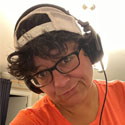
Field Engineer, University of Washington Applied Physics Laboratory
Christina Ramirez is a field engineer at the Applied Physics Laboratory (APL), University of Washington. She holds a bachelor's degree in oceanography from the University of Washington and has a broad range of experience working with vehicles both on land and underwater. Growing up in Illinois, she found her love for the ocean after moving to Seattle and started working with Seagliders after going to school for auto mechanics and working in the automotive field. She joined the APL Environmental and Integrative Systems Department from Kongsberg Underwater Technology in 2019. She enjoys DJ mixing, hiking, and camping when not spending time at sea.

Principal Engineer, University of Washington Applied Physics Laboratory
Geoff Shilling is a principal software engineer at the Applied Physics Laboratory, University of Washington, where he is a member of the Integrative Observational Platforms group. He holds a B.A. in mathematics and physics from Bates College, Lewiston, Maine. Geoff works on the software systems for Seagliders (autonomous buoyancy-driven underwater vehicles) and has been involved with the creation of several instruments designed specifically for Seagliders, including several passive acoustic recorders and a microstructure data collection system.
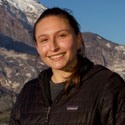
Research Engineer, University of Washington Applied Physics Laboratory
Kira Smith is a mechanical engineer at the Applied Physics Lab, University of Washington (APL-UW). She earned her Bachelor of Science in mechanical engineering from the University of Washington in 2020. For her undergraduate capstone project, Kira worked on the design of a small prototype glider, Lead Zeppelin, in partnership with APL-UW. In her current position, Kira supports mechanical design and testing for a variety of novel ocean engineering projects. This is her first research expedition.

Principal Engineer, University of Washington Applied Physics Laboratory
Sarah Webster is a principal engineer at the Applied Physics Laboratory, University of Washington (APL-UW). She earned a B.S. in mechanical engineering from the Massachusetts Institute of Technology in 2000, after which she worked at the Woods Hole Oceanographic Institution in the Deep Submergence Laboratory. While there, she designed excavation tools for remotely operated vehicle (ROV) Hercules to carry out archaeological excavations of shipwrecks, and was part of ROV Jason’s operations team. She returned to graduate school at Johns Hopkins University in 2004, where she led the design of an acoustic communication system for combined communication and navigation on underwater vehicles (including on the hybrid unmanned autonomous underwater vehicle Nereus during its historic mission to the Mariana Trench in 2009). She earned an M.S. (2007) and Ph.D. (2010), both in mechanical engineering and then spent a year and a half working as a systems engineer on the Ocean Observatories Initiative at the Consortium for Ocean Leadership in Washington, DC, before moving to the Applied Physics Laboratory at the University of Washington in 2012. She is currently working on glider-based navigation and systems to support remotely deployed autonomous vehicles, particularly for Arctic applications, as well as overseeing some engineering projects for NOAA, including the design of an environmental DNA sampler SADIE (Sampling At Depth In situ E-DNA).
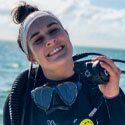
Web Coordinator, NOAA Ocean Exploration
Patricia (Trish) Albano is a member of the NOAA Ocean Exploration Outreach and Education Division. She holds a Master of Science in marine ecosystems and society and an undergraduate degree in marine and atmospheric science, both from the University of Miami. Before joining the NOAA Ocean Exploration team in 2020, Trish conducted research on coastal and pelagic sharks in Miami, the Bahamas, and South Africa as part of the University of Miami Shark Research and Conservation Program. Her research topics were largely ecologically focused, given her interest in the use of marine protected areas as conservation management tools. While conducting research with this group, Trish also managed the shark lab’s internship program, leading her to her current position as Internship Program Coordinator with NOAA Ocean Exploration. Her day-to-day job involves working with student interns in NOAA Ocean Exploration, coordinating the office’s involvement in NOAA-wide internship programs, and identifying new opportunities for training the next generation of ocean explorers. Trish is originally from Miami, Florida, but currently resides in Washington D.C, where she enjoys hiking, paddle boarding, and playing basketball.